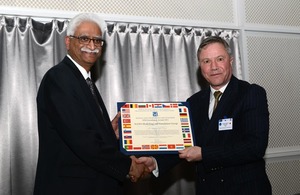NATO Award for Dstl Fellow
News story
Dstl Fellow Bharatkumar (“Bharat”) Patel has received a NATO award for his significant scientific contribution to modelling and simulation and its impact on military capability.

Dstl Fellow Bharatkumar (“Bharat”) Patel (left) receiving his a NATO award from NATO Chief Scientist Dr Bryan Wells
The NATO 2021 STO Scientific Excellence Award recognises Bharat’s impact on the development of NATO’s S&T capabilities in the areas of Modelling and Simulation (M&S) and System Concepts & Integration (SCI), and their exploitation into military capability across the Alliance. More recently, his work has been applied to disruptive concepts such as linking simulation to live Command and Control (C2) systems for operational decision support, delivering defence M&S through a digital cloud-based ecosystem, trust in autonomy/AI, human-machine teaming, cyber effects and space exploitation.
The citation reads:
Mr Bharatkumar Patel has actively led and conducted excellent collaborative and innovative M&S research on behalf of the UK for over 25 years. As National Member in STO’s (Scientific and Technology Organisation) NATO Modelling and Simulation Group and in the SCI Panel, he took on many leadership roles. Since joining the STO, he has been chair, panel mentor, program committee member, technical team member in numerous NATO technical activities. He has significantly contributed to the development of NATO’s S&T capabilities whilst enabling exploitation into military capability. He has championed C2-Sim research that has successfully matured the underpinning technology and standard, ready to be exploited into military capability. He was instrumental in developing the MSaaS [Modelling and Simulation as a Service] concept and M&S ecosystem driven by a viable business model as well as leading on its exploitation across the panels.
Bharat is an active member of numerous professional bodies including: Simulation Interoperability Standards Organization (SISO) – supporting HLA and C2Sim standardization into NATO; International Command and Control Institute (IC2I); Military Operations Research Society (FVEY); and The Operational Research Society, UK. Since 2019 he has been Co-Chair of the US/UK Synthetic Environment Working Group.
Reflecting on his achievement, Bharat said:
Although this is an individual award for the M&S and SCI areas of expertise, it also represents the excellent world class support I have received from Dstl colleagues and many others. This includes Industry/Academia and across the Ministry of Defence, from the Front Line Commands, Strategic Command, Defence Academy and the defence research and equipment community. Sustaining those relations has greatly benefited many Dstl research and MOD capability development programmes and provided the evidence to support critical business decisions.
Published 19 May 2022